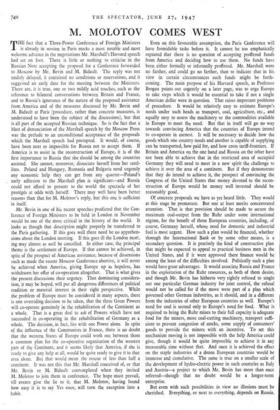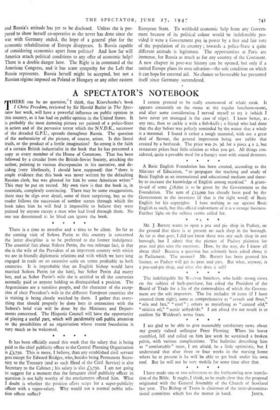M. MOLOTOV COMES WEST
THE fact that a Three-Power Conference of Foreign Ministers is already in session in Paris marks a most notable and most welcome advance in the negotiations Mr. Marshall's Harvard speech had set on foot. There is little or nothing to criticise in the Russian Note accepting the proposal for a Conference forwarded to Moscow by Mr. Bevin and M. Bidault. The reply was not unduly delayed, it contained no conditions or reservations, and it suggested an early date for the meeting between the Ministers. There are, it is true, one or two mildly acid touches, such as the reference to bilateral conversations between Britain and France, and to Russia's ignorance of the nature of the proposed assistance from America and of the measures discussed by Mr. Bevin and M. Bidault at Paris (procedure, rather than concrete measures, is understood to have been the subject of the discussions), but that is all part of the accepted Russian technique. So is the fact that a blast of denunciation of the Marshall speech by the Moscow Press was the prelude to an unconditional acceptance of the proposals which the Marshall speech had prompted. It would, of course, have been next to impossible for Russia not to accept them. If America is to assist in the reconstruction of Europe, it is of the first importance to Russia that she should be among the countries assisted. She cannot, moreover, dissociate herself from her satel- lites. Poland and Hungary, Rumania and Bulgaria need urgently any economic help they can get from any quarter—Poland's early adhesion to the Marshall plan is significant—and Russia could not afford to present to the world the spectacle of her proteges at odds with herself. There may well have been better reasons than that for M. Molotov's reply, but this one is sufficient in itself.
Mr. Bevin in one of his recent speeches predicted that the Con- ference of Foreign Ministers to be held in London in November would be one of the most critical in the history of the world. It looks as though that description might properly be transferred to the Paris gathering. If this goes well there need be no apprehen- sions about the London meeting. If this goes ill the London meet. ing may almost as well be cancelled. In either case, the principal theme is the settlement of Europe. If that cannot be achieved, in spite of the prospect of American assistance, because of dissensions such as made the recent Moscow Conference abortive, it will never be achieved when America, giving Europe up as hopeless, has withdrawn her offer of co-operation altogether. That is what gives the present discussions their urgency. That dominating considera- tion, it may be hoped, will put all dangerous differences of political tradition or material interest in their right perspective. While the problem of Europe must be considered in many aspects, there is one overriding decision to be taken, that the three Great Powers will co-operate genuinely in the rehabilitation of the Continent as a whole. That is a great deal to ask of Powers which have not succeeded in co-operating in the rehabilitation of Germany as a whole. The decision, in fact, lies with one Power alone. In spite of the influence of the Communists in France, there is no doubt that the western States of Europe could work out between them a common plan for the co-operative organisation of the western part of the Continent, and it seems likely that America, if she is ready to give any help at all, would be quite ready to give it to that area alone. But that would mean the rescue of less than half a continent. It was not this that Mr. Marshall conceived of, or that Mr. Bevin or M. Bidault contemplated when they invited M. Molotov to join them in conference. The hope must prevail, till events give the lie to it, that M. Molotov, having found how easy it is to say Yes once, will turn the exception into a habit. Even on this favourable assumption, the Paris Conference will have formidable tasks before it. It cannot be too emphatically repeated that there is no question of accepting proffered funds from America and deciding how to use them. No funds have been either formally or informally proffered. Mr. Marshall went no farther, and could go no farther, than to indicate that in his view in certain circumstances such funds might be forth- coming. The main purpose of his Harvard speech, as Professor Brogan points out cogently on a later page, was to urge Europe to take steps which it would be essential to take if not a single American dollar were in question. That raises important problemt of procedure. It would be relatively easy to estimate Europe's needs under such heads as transport, coal, agriculture, etc., and equally easy to assess the machinery or the commodities available in Europe to meet the need. But that in itself will go no way towards convincing America that the countries of Europe intend to co-operate in earnest. It will be necessary to decide how the goods which one country needs and another is capable of supplying can be transported, how paid for, and how cross tariff-frontiers. If Britain and America on the one hand and Russia on the other have not been able to achieve that in the restricted area of occupied Germany they will need to meet in a new spirit the challenge to achieve it over the area of a continent. But if they demonstrate that they do intend to achieve it, the prospect of convincing the Congress of the United States that money devoted to the recon- struction of Europe would be money well invested should be reasonably good.
Of concrete proposals we have as yet heard little. They would at this stage be premature. But one at least merits concentrated attention. That is that provision should be made to secure the maximum coal-output from the Ruhr under some international regime, for the benefit of those European countries, including, of course, Germany herself, whose need for domestic and industrial fuel is most urgent. How such a plan would be financed, whether through the International Bank or by some other means, is a secondary question. It is precisely the kind of constructive plan that might be expected to appeal to practical business men in the United States, and if it were approved there finance would be among the least of the difficulties involved. Politically such a plan would have great advantages. It would associate Russia and France in the exploitation of the Ruhr resources, as both of them desire, and though Mr. Bevin has hitherto very rightly refused to single out one particular German industry for joint control, the refusal would not be called for if the move were part of a plan which governed other German industries, as it should, and in a different form the industries of other European countries as well. Europe's need for coal is second only to Europe's need for food. What is required to bring the Ruhr minesio their full capacity is adequate food for the miners, more coal-cutting machinery, transport suffi- cient to prevent congestion of stocks, some supply of consumers' goods to provide the miners with an incentive. To set this mechanism moving is not impossible with the help America could give, though it would be quite impossible to achieve it in any measurable time without that. And once it is achieved the effect on the staple industries of a dozen European countries would be immense and cumulative. The same is true on a smaller scale of the development of hydro-electric power in such countries as Italy and Austria—a project to which Mr., Bevin has more than once referred—though that no doubt would be a longer-term enterprise.
But even with such possibilities in view no illusions must be cherished. Everything, or next to everything, depends on Russia,
and Russia's attitude has yet to be disclosed. Unless she is pre- pared to show herself co-operative as she never has done since the war with Germany ended, the hope of a general plan for the economic rehabilitation of Europe disappears. Is Russia capable of considering economics apart from politics? And how far will America attach political conditions to any offer of economic help? There is a double danger here. The Right is in command of the American Congress, and it has scant sympathy for the Left that Russia represents. Russia herself might be accepted, but not a Russian regime imposed on Poland or Hungary or any other eastern European State. To withhold economic help from any Govern- ment because of its political colour would be indefensible pro- vided it were a Government put in power by a free and fair vote of the population of its country ; towards a police-State a quite different attitude is legitimate. The opportunities at Paris are immense, for Russia as much as for any country of the Continent. A new chapter in post-war history can be opened, but only if a united Europe plans its own salvation—the sole condition on which it can hope for external aid. No chance so favourable has presented itself since Germany surrendered.



































 Previous page
Previous page